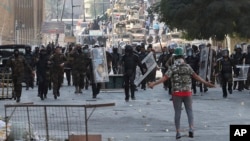The U.S. Embassy in Baghdad called on Iraqi leaders Wednesday to "engage" with participants in the country’s largest anti-government protests in decades.
Since the beginning of October, widespread demonstrations erupted in Baghdad and other parts of the country against a political class they deem corrupt and beholden to foreign interests.
“As the world watches events in Iraq unfold it is increasingly clear that the Government of Iraq and the country’s political leaders must engage seriously and urgently with Iraqi citizens who are demanding reform,” the U.S. Embassy statement said.
Statement came after the killing of more than 260 Iraqis in demonstrations since they began and the recent shuttering of the internet in Baghdad and much of Iraq.
“We deplore the killing and kidnapping of unarmed protestors, threats to freedom of expression, and the cycle of violence taking place,” the embassy declared. “Iraqis must be free to make their own choices about the future of their nation.”
Reuters reported that Iraqi security forces fired live rounds and tear gas into the air in central Baghdad on Wednesday to disperse thousands of protestors who extended the wave of anti-government protests in the capital and in southern provinces.
Medical and security sources told Reuters at least 27 people suffered tear gas-related injuries.
The protestors have resorted to civil disobedience as part of a campaign to bring the country to a standstill.
They have blocked key bridges in Baghdad and created fuel shortages by blocking the entrance to the Nassiyriya oil refinery and preventing tankers from delivering fuel to gas stations.
Last week, thousands of protestors began blocking all roads leading to Iraq’s main Gulf port of Umm Qasr, bringing it to a standstill.
The port is where Iraq gets most of its imports of grain, sugar and vegetable oils.
The internet remained blocked across much of the country on Wednesday, after being completely shut down late Monday and restored for less than four hours early Tuesday.
Security personnel have used force to disperse protestors. Additionally, arrest warrants for protest organizers arrived from Baghdad to all provinces on Tuesday, security sources said. The sources also said dozens of organizers had previously been arrested in Nassiriya and Basra.
The government of Prime Minister Adel Abdul Mahdi, who has been in office for a year, has found no peaceful response to the protests, which have been costly to the country.
A spokesman for Prime Minister Mahdi said the Umm Qasr blockade has so far cost Iraq more than $6 billion.
The government’s blocking of the internet cost Iraq’s industrial sector $1 billion in October, according to the internet outage observatory NetBlocks.
Iraq was largely stable for two years after defeating Islamic State in 2017. But despite its oil wealth, many citizens are impoverished with limited access to clean water, electricity, healthcare and education.
The cause of protestors’ grievances is the sectarian power-sharing system of governance Iraq adopted after the U.S.-led invasion in 2003.
Many demonstrators perceive the ruling elite as subservient to one or both of Iraq’s primary allies, the U.S. and Iran, which leverage Iraq as a proxy in their struggles for influence in the Middle East region.







